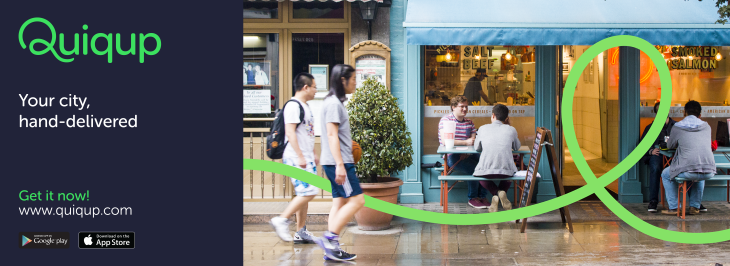London’s Quiqup, an on-demand delivery service that competes with Ingite alumni Jinn and U.S. Postmates (if and when it launches in the U.K.), has raised a “multi-million pound” Series A round from take-out ordering service Delivery Hero and Rocket Internet’s investment fund Global Founders Capital.
Delivery Hero, of course, is also partially owned by Rocket Internet and isn’t known for being an investor, but perhaps this forms part of the company’s road to a future IPO. Regardless, the mind boggles when it comes to understanding all the pieces that make up the Rocket Internet puzzle.
The german startup factory and e-commerce giant has started to develop a curious habit of building, acquiring and investing (the latter largely but not always through GFC) in startups that to varying degrees compete with one another, something that has raised eyebrows amongst a number of VCs and founders I’ve talked to.
But back to Quiqup’s news. The U.K. startup, which has thus far launched in Central London only, lets you order anything on-demand for delivery to your home or other premises. Its couriers/personal shoppers — known as Quiquees — will go to the store or restaurant and purchase what you need, promising to get it to you within the hour. Quiqup charges a fee for the delivery, plus a percentage mark up on the cost of the item.
“The app is offering brick and mortar retailers the opportunity to compete in e-commerce, by making their products immediately available to the consumer. We consider ourselves the white knight for local businesses where we aim to provide them with more visbility and reach through mobile and web platforms and access to a real time logistics solution,” the company tells me.
Since launch in September 2014, Quiqup says it has fulfilled well over 100,000 orders, spanning a number of verticals including food, groceries, fashion and electronics. Its typical customer is described as people who lead a busy life and have a serious lack of time.
“They want the ability to get what they want, when they want it. Our customers value convenience and time overall. In our world today time has become a scarce and valuable commodity. We are trying to give that back to the people,” says the company.
Quiqup (and its Series A backers) are also talking up the synergy between Delivery Hero (which operates Hungry House in the U.K.) and itself, in terms of sharing expertise in on-demand ordering and delivery.
“Given Quiqup’s expertise in last mile delivery and Delivery Hero’s global scale, there are extensive synergies and knowledge to be shared between both groups,” reads the press release.
And in a canned statement, Scott Fletcher, CEO of HungryHouse, says: “Our partnership with Quiqup will enable us to extend our key product, hungryhouse Express, and ensure that hungryhouse extends its already high growth in the UK market.”
That might suggest that Delivery Hero could begin offering delivery from more premium restaurants that don’t traditionally offer delivery, which in turn would mean encroaching on a number of startups that do just that. Some of which Rocket Internet has invested in or acquired. And of course there is extremely well-funded Deliveroo.
With that said, on the topic of competitors, Quiqup had this to say:
We consider ourself very different from other on-demand services in London.
We are different than Deliveroo in that we can pickup anything and everything, not just takeaway. We also aren’t limited by radius, we can bring you your favourite meal all the way across town. We also don’t limit customers in their choices.
We are very proud of our Quiquees (what we call our drivers), as they are hand-picked to shop on behalf of our customers. Our customers feel very happy sending our Quiqiees to run personal errands for them.
We are also the only on-demand delivery service that is open for breakfast, and we will soon be open 24/7.
A number of people have recently asked us about Amazon PRIME NOW. We feel we are very different, instead of bringing our customers a generic stock from a warehouse, we are delivering from their nearby high-street shops, giving power back to the local retailer.
Incidentally, I’ve also learned that Jinn has closed a further £1 million in funding.
What’s clear is that the on-demand space is certainly one to watch, not least Rocket Internet’s growing presence right across food delivery and beyond.
